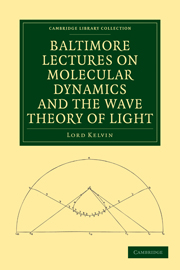Book contents
- Frontmatter
- PREFACE
- Contents
- ERRATA
- NOTES OF LECTURES ON MOLECULAR DYNAMICS AND THE WAVE THEORY OF LIGHT
- ADVERTISEMENT
- LECTURE I
- LECTURE II
- LECTURE III
- LECTURE IV
- LECTURE V
- LECTURE VI
- LECTURE VII
- LECTURE VIII
- LECTURE IX
- LECTURE X
- LECTURE XI
- LECTURE XII
- LECTURE XIII
- LECTURE XIV
- LECTURE XV
- LECTURE XVI
- LECTURE XVII
- LECTURE XVIII
- LECTURE XIX
- LECTURE XX
- APPENDIX A ON THE MOTION PRODUCED IN AN INFINITE ELASTIC SOLID BY THE MOTION THROUGH THE SPACE OCCUPIED BY IT OF A BODY ACTING ON IT ONLY BY ATTRACTION OR REPULSION
- APPENDIX B NINETEENTH CENTURY CLOUDS OVER THE DYNAMICAL THEORY OF HEAT AND LIGHT
- APPENDIX C ON THE DISTURBANCE PRODUCED BY TWO PARTICULAR FORMS OF INITIAL DISPLACEMENT IN AN INFINITELY LONG MATERIAL SYSTEM FOR WHICH THE VELOCITY OF PERIODIC WAVES DEPENDS ON THE WAVE-LENGTH
- APPENDIX D ON THE CLUSTERING OF GRAVITATIONAL MATTER IN ANY PART OF THE UNIVERSE
- APPENDIX E AEPINUS ATOMIZED
- APPENDIX F
- APPENDIX G HYDROKINETIC SOLUTIONS AND OBSERVATIONS
- APPENDIX H ON THE MOLECULAR TACTICS OF A CRYSTAL
- APPENDIX I ON THE ELASTICITY OF A CRYSTAL ACCORDING TO BOSCOVICH
- APPENDIX J MOLECULAR DYNAMICS OF A CRYSTAL
- APPENDIX K ON VARIATIONAL ELECTRIC AND MAGNETIC SCREENING
- APPENDIX L ELECTRIC WAVES AND VIBRATIONS IN A SUBMARINE TELEGRAPH WIRE
- INDEX
APPENDIX F
Published online by Cambridge University Press: 05 March 2012
- Frontmatter
- PREFACE
- Contents
- ERRATA
- NOTES OF LECTURES ON MOLECULAR DYNAMICS AND THE WAVE THEORY OF LIGHT
- ADVERTISEMENT
- LECTURE I
- LECTURE II
- LECTURE III
- LECTURE IV
- LECTURE V
- LECTURE VI
- LECTURE VII
- LECTURE VIII
- LECTURE IX
- LECTURE X
- LECTURE XI
- LECTURE XII
- LECTURE XIII
- LECTURE XIV
- LECTURE XV
- LECTURE XVI
- LECTURE XVII
- LECTURE XVIII
- LECTURE XIX
- LECTURE XX
- APPENDIX A ON THE MOTION PRODUCED IN AN INFINITE ELASTIC SOLID BY THE MOTION THROUGH THE SPACE OCCUPIED BY IT OF A BODY ACTING ON IT ONLY BY ATTRACTION OR REPULSION
- APPENDIX B NINETEENTH CENTURY CLOUDS OVER THE DYNAMICAL THEORY OF HEAT AND LIGHT
- APPENDIX C ON THE DISTURBANCE PRODUCED BY TWO PARTICULAR FORMS OF INITIAL DISPLACEMENT IN AN INFINITELY LONG MATERIAL SYSTEM FOR WHICH THE VELOCITY OF PERIODIC WAVES DEPENDS ON THE WAVE-LENGTH
- APPENDIX D ON THE CLUSTERING OF GRAVITATIONAL MATTER IN ANY PART OF THE UNIVERSE
- APPENDIX E AEPINUS ATOMIZED
- APPENDIX F
- APPENDIX G HYDROKINETIC SOLUTIONS AND OBSERVATIONS
- APPENDIX H ON THE MOLECULAR TACTICS OF A CRYSTAL
- APPENDIX I ON THE ELASTICITY OF A CRYSTAL ACCORDING TO BOSCOVICH
- APPENDIX J MOLECULAR DYNAMICS OF A CRYSTAL
- APPENDIX K ON VARIATIONAL ELECTRIC AND MAGNETIC SCREENING
- APPENDIX L ELECTRIC WAVES AND VIBRATIONS IN A SUBMARINE TELEGRAPH WIRE
- INDEX
Summary
DYNAMICAL ILLUSTRATIONS OF THE MAGNETIC AND THE HELIÇOIDAL ROTATORY EFFECTS OF TRANSPARENT BODIES ON POLARIZED LIGHT
The elastic reaction of a homogeneously strained solid has a character essentially devoid of all heliçidal and of all dipolar asymmetry. Hence the rotation of the plane of polarization of light passing through bodies which either intrinsically possess the heliçidal property (syrup, oil of turpentine, quartz crystals, &c), or have the magnetic property induced in them, must be due to elastic reactions dependent on the heterogeneousness of the strain through the space of a wave, or to some heterogeneousness of the luminous motions dependent on a heterogeneousness of parts of the matter of lineal dimensions not infinitely small in comparison with the wave length. An infinitely homogeneous solid could not possess either of those properties if the stress at any point of it was influenced only by parts of the body touching it; but if the stress at one point is directly influenced by the strain in parts at distances from it finite in comparison with the wave length, the heliçoidal property might exist, and the rotation of the plane of polarization, such as is observed in many liquids and in quartz crystals, could be explained as a direct dynamical consequence of the statical elastic reaction called into play by such a strain as exists in a wave of polarized light.
- Type
- Chapter
- Information
- Publisher: Cambridge University PressPrint publication year: 2010First published in: 1904



